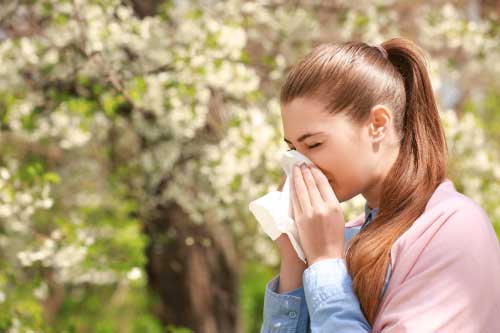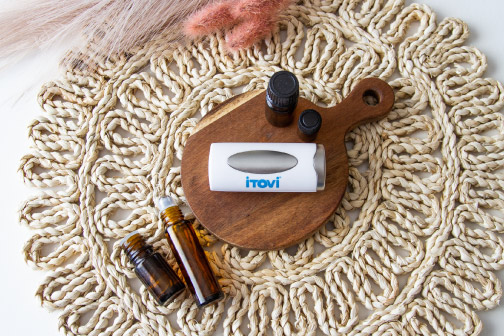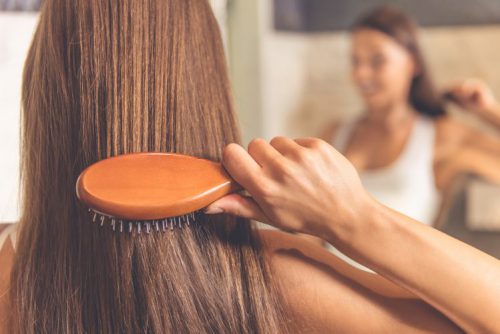
Allergies—the sneezing, swelling, and other unpleasant symptoms that happen when your immune system drastically overreacts to…well…anything.
Airborne pollen and dust mites are common culprits (hence the annual hay fever in spring). But it’s also common to experience an allergic reaction to pet fur, dander, insect stings, certain medications, latex, and about a thousand different types of food! You could even be allergic to certain essential oils! 🙁
It just depends on what your body misjudges as a serious threat to your health.
Unfortunately, there is no ultimate way for cure allergies. However, there is a little we can do to protect ourselves from developing allergies and a few things we can do to either prevent allergies from acting up or reduce their severity. And essential oils can help!
Developing Allergies: How it Happens and How to Stop It
Are we born with our allergies? Or are they made?
Well—it’s kinda both.
While scientists do not believe that anyone is born with an allergy to any substance, you can be born with a predisposition (due to certain genes) to develop an allergy.
The real moment of truth comes when you are first exposed to a potential allergen—be it Mr. Fluffy’s dander, a peanut, or ragweed pollen.
Depending on the state of your immune system at that moment, your body may either identify this new substance as strange, but harmless and pass it along normally or your body may initiate “allergic sensitization”, in which it teaches itself to have a defensive, allergic response to that particular substance.
There are still many unknowns as to why allergic sensitization happens. And this makes it hard to prevent. However, the one lead we have is that children who are exposed to potential allergens (a diverse range of foods, animal fur and dander, etc) at an appropriate age seem less likely to develop allergies to those substances.
So childhood visits to petting zoos might not be a bad idea!
Preventing & Reducing Allergy Symptoms
Once you’ve developed an allergy to a substance, you are pretty much guaranteed to have that allergy for life. Annoying? Yes.
But apart from simple avoidance tactics (avoiding your neighbor’s cat, staying indoors during hay fever season, etc), there are a few other things you can do to help keep your symptoms at bay or reduce their severity.
Step 1: Take Good Care of Your Immune System
Yes, yes, we know that this whole allergy mess began because of the immune system. But even so, a strong, healthy immune system (especially with lots of immunoglobulin A [IgA]) can help minimize allergy symptoms.
What can I do? What can my essential oils do?
- Do the wellness basics. Your immune system health is kept in balance by the right amount of high-quality sleep, stress management, a healthy diet, and exercise.
- Eat for your gut health. It is believed that 70% of your immune system is in your gut! So be sure to get plenty of healthy fiber and probiotic foods (yogurt, kefir, pickles, kimchi, etc) into your diet.
- Take good care of your skin & lungs. Toxins can’t burden down your immune system if they can’t get past your first defensive layers—your skin & lungs! So treat them well and your immune system will thank you for it!
- For more in-depth detail and tips about taking care of your immune system + which essential oils are best for immune-system support, check out our post: Your Immune System & Essential Oils
Step 2: Make Your Environment Anti-Allergen
Allergens can be sneaky. They can float invisibly through the air, lurk on household surfaces, build up in carpet, or even get stuck on pillows, mattresses, or even house plants!
But if allergens want to attack you on your home turf, they’re going to have to deal with your housekeeping skills!
What can I do? What can my essential oils do?
- Protect your home air quality. This could mean changing your filters, getting a dehumidifier, or cleaning the air with essential oils. Check out our guide on air purification for more details.
- Routine cleaning. Regular dusting, vacuuming, and general cleaning will help keep your home free of potential allergens and respiratory/skin irritations. You can even use your essential oils to help you disinfect surfaces!
- Protect your sleeping space. Spending 8 hours a day in bed allows dead skin cells, bacteria, and other potential allergens to build up on your sheets. So, be sure to wash your bedding weekly. You can even use allergen-proof covers on pillows and mattresses if you wish.
Step 3: Fight Inflammation & Histamines
Many of your worst allergy symptoms arise because your immune system has mistakenly released a lot of extra histamine, which triggers lots of extra inflammation in the body, often in the nose, throat, stomach, or skin.
(Extra histamine can even contribute to mood disorders such as anxiety and depression!)
And while many people use over-the-counter antihistamines or anti-inflammatories to reduce their allergy symptoms, there are also some natural, essential oils-supported options to get the job done.
What can I do? What can my essential oils do?
- Use oils to block the effects of histamine. There are only a few early studies on the antihistamine effects of essential oils. Promising candidates include Blue Tansy, German Chamomile, Lavender, Oregano, and Peppermint. Try diffusing, inhaling, or topically applying these oils (with proper dilution) over the affected area.
- Use essential oils to open up your airway. Eucalyptus is the best-researched oil for respiratory health, but you may also try diffusing, inhaling, or topically applying Peppermint oil, Rosemary oil, or Oregano oil. Appropriately mixing these oils with a warm steam bath may help!
- Reduce inflammation with essential oils. Many essential oils carry anti-inflammatory properties. Tea tree oil has been particularly studied as a remedy to histamine-related skin inflammation (1, 2). And other oils to consider are Frankincense, Lavender, Peppermint, and Chamomile.
| Class Ideas |
|




